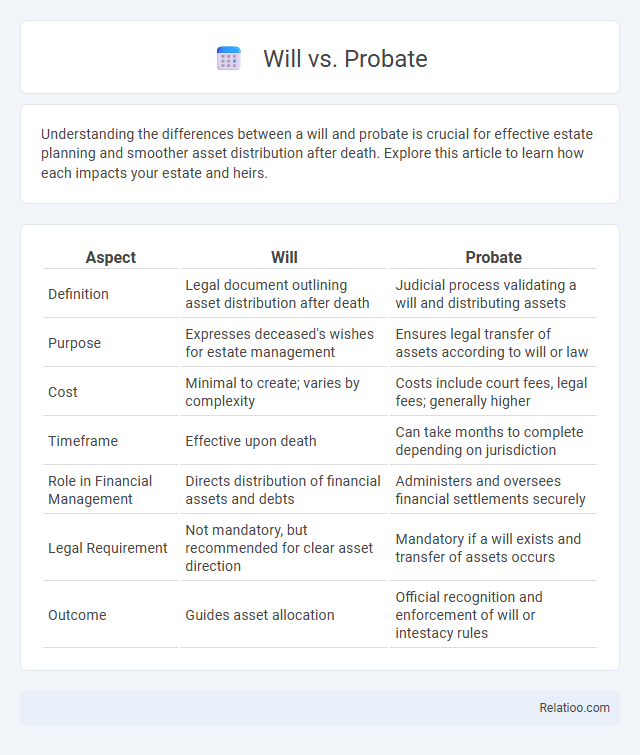Understanding the differences between a will and probate is crucial for effective estate planning and smoother asset distribution after death. Explore this article to learn how each impacts your estate and heirs.
Table of Comparison
| Aspect | Will | Probate |
|---|---|---|
| Definition | Legal document outlining asset distribution after death | Judicial process validating a will and distributing assets |
| Purpose | Expresses deceased's wishes for estate management | Ensures legal transfer of assets according to will or law |
| Cost | Minimal to create; varies by complexity | Costs include court fees, legal fees; generally higher |
| Timeframe | Effective upon death | Can take months to complete depending on jurisdiction |
| Role in Financial Management | Directs distribution of financial assets and debts | Administers and oversees financial settlements securely |
| Legal Requirement | Not mandatory, but recommended for clear asset direction | Mandatory if a will exists and transfer of assets occurs |
| Outcome | Guides asset allocation | Official recognition and enforcement of will or intestacy rules |
Understanding the Difference Between Will and Probate
A will is a legal document outlining how a person's assets and estate should be distributed after death, while probate is the court-supervised process of validating that will and managing the estate's distribution. Understanding the difference between a will and probate is essential because having a valid will does not eliminate the need for probate, though probate ensures the will's authenticity and proper execution. Probate can be time-consuming and costly, making it important to plan estate strategies that minimize the probate process.
What is a Will? Key Features Explained
A will is a legal document that outlines how a person's assets and property will be distributed after their death. Key features of a will include naming beneficiaries, appointing an executor to manage the estate, and specifying guardianship for minor children. Unlike probate, which is the legal process of validating a will, a will itself serves as the primary guide for estate distribution.
The Probate Process: An Overview
The probate process involves legally validating a will, ensuring debts and taxes are paid, and distributing assets to beneficiaries. Probate courts oversee the appointment of executors, inventory of estate property, and resolution of disputes, which can take several months to years depending on estate complexity. Understanding probate is essential for managing wills effectively and minimizing legal delays in estate settlement.
Why Having a Will Matters in Estate Planning
Having a will is crucial in estate planning because it ensures your assets are distributed according to your wishes and helps avoid the lengthy and costly probate process. Without a will, state laws dictate asset division, which may lead to unintended outcomes and family disputes. Properly drafted wills streamline probate, protect beneficiaries, and provide clear instructions for the management of your estate.
How Does Probate Work After Death?
Probate is the legal process that validates a will and oversees the distribution of your assets after death, ensuring debts are settled and property is transferred according to your wishes. The court appoints an executor or administrator to manage your estate, pay taxes, and resolve disputes during probate. Understanding how probate works after death helps your loved ones navigate this complex system efficiently and avoid unnecessary delays.
Advantages of Avoiding Probate
Avoiding probate saves time, reduces legal fees, and maintains privacy by keeping your estate matters out of public court records. Your beneficiaries can receive their inheritances more quickly and with less stress, ensuring a smoother transfer of assets. This efficiency helps protect your loved ones from prolonged administrative processes and unnecessary expenses.
Common Misconceptions About Wills and Probate
Many people mistakenly believe that having a will automatically avoids probate, but probate is the legal process required to validate a will and distribute assets. You should understand that probate can be time-consuming and costly, but it provides a court-supervised method to ensure your estate is handled properly. Misconceptions about bypassing probate with a will alone often lead to unexpected delays and complexities in estate administration.
Role of Executors in Will and Probate
Executors play a crucial role in both wills and probate processes by managing your estate according to your wishes laid out in the will. They gather assets, pay debts and taxes, and distribute property to beneficiaries under court supervision during probate. Their responsibilities ensure a smooth transfer of your estate rights and legal compliance throughout the probate process.
How to Minimize Probate Delays and Costs
Creating a comprehensive will that clearly outlines asset distribution can significantly reduce probate delays and costs by minimizing disputes. Utilizing living trusts and payable-on-death accounts transfers assets outside probate, streamlining the process and lowering expenses. Promptly updating estate plans and consulting with an estate attorney ensures compliance with current laws, further preventing costly probate complications.
Estate Assets: What Goes Through Probate?
Estate assets that go through probate typically include real estate, bank accounts, and investments solely in the deceased's name without designated beneficiaries. Assets held in joint tenancy or with named beneficiaries, such as life insurance policies and retirement accounts, usually bypass probate. Understanding what assets require probate helps you plan your estate efficiently to minimize delays and costs after your passing.

Infographic: Will vs Probate
 relatioo.com
relatioo.com